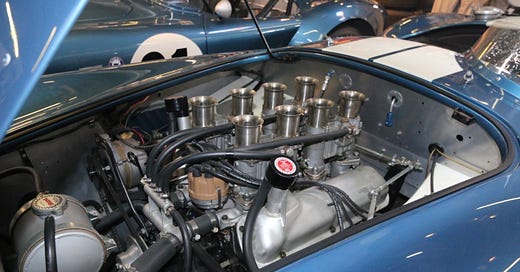I love power. So much, from the age of not quite ten, the feeling thereof has flowed through the very fibers of my body. Worse, my first experience became a ho-hum memory I still cherish as I progressed to more powerful modes of power. In time I learned about horsepower, torque, slush-boxes (automatics), manuals (real men), and a host of other non-descript parts that went along with the ability to harness said power. And because of the Lord above, I fell madly in love with power. Except, only to a point.
Anyway, during the American Revolution, in haste, thirteen independent States formed a government under “Articles of Confederation” (AOCs). The key being independent: No formal body of power able to control overall. Defined: Confederation, The act of confederating; a league; a compact for mutual support; alliance; particularly of princes, nations or states (Webster’s 1828). Except, the war itself and time proved the AOCs untenable: A strong sense of the value and blessings of Union induced the people, at a very early period, to institute a Federal Government to preserve and perpetuate it. They formed it almost as soon as they had a political existence; nay, at a time when their habitations were in flames, when many of their citizens were bleeding, and when the progress of hostility and desolation left little room for those calm and mature inquiries and reflections which must ever precede the formation of a wise and well-balanced government for a free people. It is not to be wondered at, that a government instituted in times so inauspicious, should on experiment be found greatly deficient and inadequate to the purpose it was intended to answer (Federalist 2).
Thus, in failure, then ratification of the Constitution, States were to hold power over the Fed, and WE THE PEOPLE, overall. A constitutional republic, not a democracy by design. And the States, in order to protect their sovereignty and power, through legislatures would appoint senators purposely: The powers delegated by the proposed Constitution to the federal government are few and defined. Those which remain in the State governments are numerous and indefinite. The former will be exercised principally on external objects, as war, peace, negotiation, and foreign commerce; … The powers reserved to the several States will extend to all objects which, in the ordinary course of affairs, concern the lives, liberties, and properties of the people, and the internal order, improvement, and prosperity of the State (Federalist 45). The Federal, in truth, subservient to the States. The States, in theory, controlling the Fed, especially in powers granted.
Well, like my days of yore and the desire to control as much power as possible, the Federal sought the same, control: The Senate of the United States shall be composed of two Senators from each State, elected by the people thereof, for six years; and each Senator shall have one vote. The electors in each State shall have the qualifications requisite for electors of the most numerous branch of the State legislatures. When vacancies happen in the representation of any State in the Senate, the executive authority of such State shall issue writs of election to fill such vacancies: Provided, That the legislature of any State may empower the executive thereof to make temporary appointments until the people fill the vacancies by election as the legislature may direct. This amendment shall not be so construed as to affect the election or term of any Senator chosen before it becomes valid as part of the Constitution (Seventeenth Amendment of the Constitution ratified April 8, 1913). By the stroke of a pen, power centralized in DC, including the beginning of the end of our constitutional republic, albeit through the vote of the people, except: The Federal and State Governments are in fact but different agents and trustees of the people, constituted with different powers, and designated for different purposes. The adversaries of the Constitution seem to have lost sight of the people altogether in their reasonings on this subject; and to have viewed these different establishments, not only as mutual rivals and enemies, but as uncontrolled by any common superior in their efforts to usurp the authorities of each other (Federalist 46).
Anyway … going back to the past, in the American V-8s evolution, to obtain both horsepower and high torque required the big-block. Engines that were low revving, of massive weight and size, and cars carrying one couldn’t turn worth a damn when the lump (engine) sat over the front wheels, pushing the car through a corner, otherwise known as understeer. They were more suited for straight line (drag racing) or turning left (Nascar). But for me and my love of power, through experience in cars, no more than the small-block V-8 was needed. And in my love for motorcycles, after spending time with one-lung (cylinder) bikes, the in-line four rice burner (Honda) became my chosen mode. Now, both the small-block V-8s and fours are “high” horsepower, high revving engines, but they lacked the said torque of the big-block. The difference being: Horsepower is go-fast, while torque also pulls tree stumps along with going fast. So, power being an elixir, in time, some mounted big-blocks mid-ship in cars, thereby allowing a “balance.” But for me, the sound of a high revving small block, unmistakable, a symphony of American brutality harnessed in a small package, while rice burners, a melody reminiscent of F1. Both are truly art in sound motion.
And the moral here, size isn’t always the best arbiter of engine or government. The nation’s Framers having designed one supposedly small and limited in power through WE THE PEOPLE: … the ultimate authority, wherever the derivative may be found, resides in the people alone, and that it will not depend merely the comparative ambition or address of the different governments, whether either, or which of them, will be able to enlarge its sphere of jurisdiction at the expense of the other. Truth, no less than decency, requires that the event in every case should be supposed to depend on the sentiments and sanction of their common constituents (Federalist 46). So, remember, smaller is better, as larger becomes just weighted bulk.
Plus, as power is now centralized and the size of government balloons, remember a single word descriptive: Autarchy. Defined: Absolute rule or power (American Heritage Dictionary). Then amendments: Are they really needed modes of constitutional correction? Just think, the Constitution on its face is remarkable, but the country is in trouble because of amendments. Then ask yourself: Who are the adversaries of the Constitution today? And mind you, in describing the beauty of engine power, outside of the possible size bulk, I left out the transfer thereof to the rear wheels; automatically or manually and which is best. Although don’t automatically believe the centralizing of power helped balance control. All the weight in one place only made things understeer. And maybe the power to do so was better left in the manual separation of State over Federal; like double-clutching. Totally sweet when done correctly, especially at full-rev.








I don't always comment, but I do always agree.
Good, but why are you not sitting in the care? AREN'T "We the People"? What caused us to let go of the power? We were stupid! The cars were alot lighter (roadsters) than today's 4 door sedans?